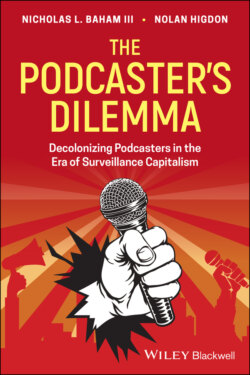Читать книгу The Podcaster's Dilemma - Nolan Higdon - Страница 9
Decolonization
ОглавлениеCritical scholars remind us that power relations are not fixed and that liberation from dominant ideologies is possible through a critical examination of media and power, in a process known as decolonization.28 Chantal J. Zabus explains that decolonization “refers to the shedding of colonial relics inherited from colonial history in all spheres (not only the socio-economic and political), accompanied by an inward-looking, autarkic movement that will lead to the decolonization of mentalities and is tied to economic de-linkage from Western Powers.”29 As Last Moyo notes, in media “the aim of decolonial turn is not to reproduce a new Hegelian hierarchies or new knowledge power structures in the field, but to give birth to a truly multicultural critical media theory that emerges from intercultural and trans-epistemic dialogue between the geographic Northern and Southern epistemologies.”30
As a field of study, decolonization is rooted in the experience of indigenous peoples.31 Eve Tuck and K. Wayne Yang remind us that decolonization “brings about the repatriation of Indigenous land and life; it is not a metaphor for other things we want to do to improve our societies and school.”32 Colonization is brought about by imperialism, and the malignant settler mentality of empire is anathema to decolonization.33 A colonial mentality is an attitude of ethnic and cultural inferiority that results from colonization.34 Colonial mentalities are hegemonic forces that cause the colonized to internalize the belief that the culture of their colonizer is more valuable than their own.35 Indeed, psychologists have found that the adoption of colonial mentalities is associated with mental health issues such as anxiety and depression.36 Critical media scholars explain that cultural hegemony enables the ruling class to break the psyche of the colonized and enable the internalization of colonial mentalities.37
Scholars have noted that decolonization produces counter-knowledge through the process of interrogation and critique.38 Similarly, Antonia Darder notes:
Central to the qualitative labor of a decolonizing interpretive approach are radical processes of social inquiry, critique, and cultural reformulation (or reinvention, as Paulo Freire would say) that strike at the very heart of dominant ideologies linked to persistent asymmetrical practices – practices that, wittingly or unwittingly, reproduce classed, racialized, gendered, sexual, abled, religious, and other social and material formations that sustain fundamental inequalities and exclusions.39
Indeed, rather than remaining bivouacked, the podcasters we surveyed confront dominant ideologies through a process of inquiry, critique, and cultural reformulation that focuses on the expressions of power invested in identity. In this sense, to critique is to interrogate the values and beliefs that legitimize power and reveal its often hidden or opaque logic at work.40 “Interrogation” is a term often narrowly applied to discourses about law enforcement or state agents asking tough questions of captives.41 But, insofar as it relates to decolonization, the process of interrogation involves questioning sources of power rather than individuals.42 Decolonization uses interrogation as a means of deconstructing dominant power structures for the purposes of liberation43 – or, as Darder explains, interrogation “functions in the interest of deconstructing and reconstructing conditions for transformative practice and social empowerment.”44
This process of deconstructing dominant cultural concepts and of stripping the colonizer’s language “of its negative connotations” necessitates more than interrogation and critique. It demands the production of counter-narratives that displace dominant ones.45 It involves moving concepts of the oppressed and the colonized from the margins to the center of the public square. A counter-narrative is “a story that resists an oppressive identity and attempts to replace it with one that commands respect.”46 Scholars have noted the critical association between counter-narratives and decolonization. For example, Darder observes that
critical research must be linked to emancipatory efforts to dismantle oppressive theories and practices, in an effort to transform existing conditions. This calls for a research process that can support the creation of intellectual and social spaces where alternative readings of the world can exist in the interest of liberatory practice and social justice.47
The literature on decolonization emphasizes that decolonization is a process that ultimately leads to transformative “action.”48 Decolonization research is grounded in indigenous peoples’ demanding self-determination and using the decolonization process to achieve indigenous utopianism.49 Indigenous utopianism is an aspirational concept that refers to an ancient past, which activists seek to bring about in the present in the form of freedom and self-determination.50 Media are a powerful cultural force and, just as they can reinforce colonial mentalities, they can also offer a space of liberation from them.
